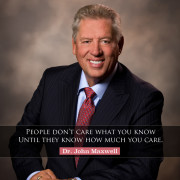“Be genuinely interested in everyone you meet and everyone you meet will be genuinely interested in you.”
― Rasheed Ogunlaru
If you’re an introvert, you’ve probably had instances of where you feel alone – even if you’re in the middle of a room of people. You look around you and all you see are others having a good time. You wouldn’t mind having fun too, but you don’t know anyone. To keep from looking like a loser, you play around with your phone or, better yet, start tinkering with any musical instruments that might be available. At the same time, you might be wondering, “How did I get here?” and “How do I get out?”. And, to be honest, you’re not alone.
Funny enough, all people are social. It’s part of being human. Otherwise you wouldn’t have come to this event. The catch is that some people are social in a different ways than others. Introverts, by our very nature, tend to have just a few key relationships at any one given time. However, there are times where we need to expand our horizons and meet other people that might be new friends… or, better yet, help us move on in life.
So here’s the million dollar question. How do you meet people at live events? Below is a 4 part strategy I’ve used to meet interesting people at events that I have gone to in the past.
Get Your Mind Right
Whether you’re at a job fair, a party, or a networking meeting, there are going to be people you just don’t know. But the thing is that everyone you know now besides your family are people at one time you didn’t know – (even your gaming group if you’re a gamer). How did you become friends with those people? More than likely you shared something in common. The people who are around you at this event, what do you share with them in common? That’s where you can start the conversation.
Also, there’s a good chance that other people there are introverts too and they’re just as scared as you are in reaching out. The problem is, you won’t know immediately who those people are. So it’s best to just think of all of these new faces as being just as worried as you.
Before moving onto the next part of the strategy, I want to note that just because you’re there for a certain reason doesn’t mean that you have permission to interact with people based on that permission. In fact, you probably don’t want to. Most people can sense when others want to take advantage of them. So the idea is that you don’t want to go into meeting people thinking that you’re going to get something. That type of thinking will more than likely backfire. Instead, think of yourself as a co-host of the event. You’re just there to make sure everyone has a good time. Genuinely care about those around you. Introduce people to other people. Or if you know of a tool or trick that can help someone else, teach them about it. If you can’t care about those around you, you might just want to rethink about the reason you’re there.
Make a Plan
The truth is that you’re probably not going to know everyone at this event, but that’s ok. If you’ve ever gone to a job fair, you know that it helps to research companies that are going to be there. However, not all events are job fairs, and not everyone is a recruiter. So how do you prepare?
Depending on the event, there’s a good chance you might actually know one person: the host. Even if you don’t know the host, they’re the easiest person to find out information on. So see what you can dig up on them. That’s the first thing.
The next thing you could do is email them or any other people who are putting the event together. See if there is anything you can do to help set up the event or just help in general. Even if it’s a party or cookout, helping with the keg, cleaning up, or simply helping move furniture would be appreciated.
As mentioned before, you might want to act as co-host and make the actual host’s job easier. Ask them if there’s anything you can do during the event. There might be a couple of people that might need to be paid more attention to or there might be a position that could use assistance. If the host doesn’t have anything for you, simply be interested in what others are doing and up to. Act the part of the co-host anyway. Ask if you can get them anything, help them with anything, or simply be friendly. Whether or not you’re given things to do by the host or you just play the part, you’ll get the chance to meet some interesting people AND you’ll have purpose for why you’re engaging with them.
Be Present at the Event
So the big day has arrived and you’re on your way to the event. Time to get friendly, right?
Wrong. Actually, you should have started getting friendly before this point. One thing I do on the day of event is make sure that I’m loaded up on caffeine and talked to anyone about anything that day. Get the awkwardness out early. In fact, I try to have talked to at least 5 people before I go to the event just so my mind is awake and I’m receptive to whatever might go on at the event.
Having problems chatting with people? Trying to overthink your entry banter? Don’t. Instead, think of a simple acronym: F.O.R.M. This stands for Friendly, Occupation, Recreation, and Message.
- Friendly – Just take a stab at the weather or compliment something that the person is wearing. Find out what brings them to the event.
- Occupation – Ask them what they do for a living. People love talking about what they have to think about all day. Feel free to ask about how things work or why they enjoy doing that particular job.
- Recreation – They can only talk about work for so long, however. Ask them about what they like to do for fun. Find out what they like doing with their family. You might luck out and have something in common there. Just make sure you’re not drilling them with question after question.
- Message – If this person sounds cool, then perhaps it might be a good idea to get to know them further. “Hey, if you’re ever in the area, we should play a round of… ” or “Hey, I’d love to pick your brain about…” or even “Hey, the next time you’re in town, I’ll show you around.” People love to be invited to do things or to get to talk about their journeys. If none of those are good requests, just let them know what you’re looking for and let them know you’ll be in contact as well about what they’re looking for.
It doesn’t have to be genius talk. But don’t be a robot and do it with everyone, change it up a little bit. Also, for bonus, if there are business cards being passed out, feel free to write some notes on it about them.
Another thing you can do is smile. When people look your direction, just a grin and a nod will do. Smiles are contagious and they show confidence. However, just make sure you don’t go overboard.
If people are a little reserved, be reserved with them. As an introvert, you should have this part down!
Of course this all doesn’t matter if YOU’RE NOT PRESENT. To be truly present is to make sure you’re giving the person you’re speaking with all of your attention. Listen and hear what they’re actually saying when you’re engaging with them. In fact, now would be a good time for me to mention that you never know who a person knows. At any one time, you might be one person away from having your world turned upside down (for the better). So make sure you’re in the moment.
Follow Up
Was there someone that you truly connected with at the event? If so, you need to reconnect with them in 24 to 48 hours. This is Networking 101. Best way that I can think of doing this is by following up with some sort of link or article that might help with something that they mentioned. If you don’t have anything to offer, just send a message saying it was nice to meet them. If you wait longer, there’s a good chance that it might never happen OR they might have forgotten you.
If they really changed your perspective on things, feel free to go for the mentions on Social Media, or if you have a platform, feel free to write about them there too!
Be Unforgettable By Being You
Finally, I’ll say that to be remembered, you need to be you. If you’re talking with someone that you look up to or you think might be looking down on you, don’t try to be a Puffer Fish. Being someone you’re not will inevitably blow up in your face.
If you’re worrying about what to say in person, write in a followup, or do… Stop. Just care about who you’re engaging with. In the end, we’re all going along the same path. Go for authenticity. Just say hi, introduce yourself, and go from there.
Homework:
The next time you hear yourself wanting to meet new people, whether it’s for a new job, to find new clients, or just to gain new friends, feel free to use these tactics. The more you practice these 4 steps to engage with people, the easier it will become for you to talk with others in the future. Remember, this is simply a framework to get you out of your shell at first. There is nothing wrong with changing the game up a bit or seeing what works for you.
Chime in below with your results or if you’ve recently figured out how to engage with people let us know what worked for you.








